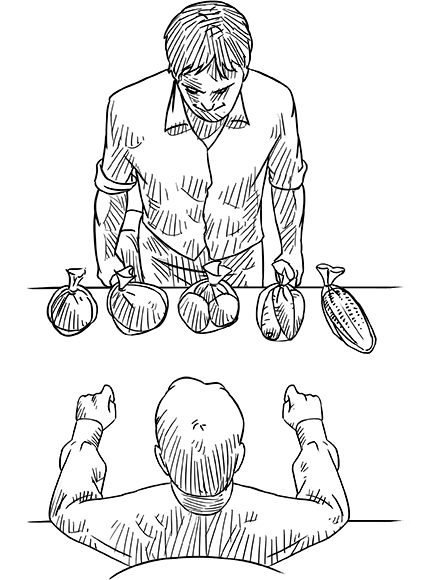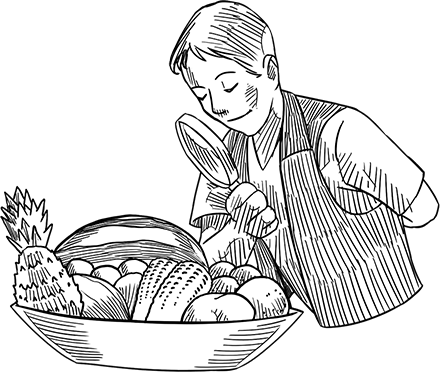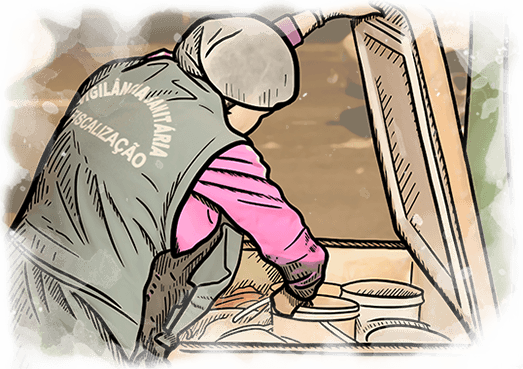Quality control
That´s right! Foodstuffs to be acquired from smallholder farming to the PNAE go through quality control. The Executive Entity, which is responsible for inspecting the quality of these goods, can foresee the presentation of food samples in the public call, so they can be previously submitted to quality control according to relevant legislation.

Participation of smallholder farming in school feeding.
A smallholder farmer of a Land Reform settlement, in the outskirts of Cidade de Goias, talks about the benefits obtained with investments in the quality of local agricultural production for the PNAE, PAA and others.
Attention
- The farmer or organization temporarily ranked as first place (and so on, until the necessary qualifications are met) must present food samples, which will serve as evaluation of the product to be acquired immediately after the selection of selling projects.
For a sample of quality control, Executive Entities can foresee schedules of delivery according to their seasonality, submitting contracts to such conditions.


Three criteria will be used in the evaluation of goods:
if they attend to public call specifications;
if they have sanitary certification, when this demand is proved necessary;
if they attend to the sample test, when it is possible to qualify their sensory characteristics.
The first two criteria are used for the entire smallholder farming acquisition. The third one only happens when samples are requested.
This step is especially relevant for products that demand sanitary certification. After all, smallholder farming goods must attend to sanitary legislation.

Participation of smallholder farming in school feeding.
A smallholder farmer of a Land Reform settlement, in the outskirts of Cidade de Goias, talks about the need to comply with sanitary demands for the selling of production for school feeding.
Important!
Foodstuffs to be acquired for school feeding must answer to food legislation established by one of the following sanitary services:
Ministry of Agriculture
As for plant-based products that have been through some type of processing, these must answer to sanitary regulations, be analysed by Anvisa, and inspected by Visa.
If the product is fruit pulp, for example, the establishment must have a registration at the Ministry of Agriculture and the product must have an inspection seal.

KNOW MORE
All animal-based products, including eggs and honey, need sanitary evaluation. The Ministry of Agriculture is responsible for sanitarily evaluating these products. They may be inspected by one of the following instances: Municipal Inspection Service – SIM (allows commercialization in municipalities); State Inspection Service – SIE (allows commercialization in the state); Federal Inspection Service – SIF (allows nationwide commercialization).
Beyond these certifications, there is the Unified System of Attention for Agricultural Sanitation (Suasa), which consists of a federal initiative that seeks to unify ways of sanitary certification for animal-based products – still to be implemented.
For further information on sanitary inspection services, go to:
- Resolution-RDC, no. 49, of October 31st,2013, that states the exercise of sanitary activities for individual entrepreneur, rural smallholder farmer entrepreneurship and solidary economic entrepreneurship.
- Resolution-RDC, no. 278, of September 22nd,2005, that establishes categories of Foods and Packages with and without registration obligations.
- • Manual on Sanitary Inspection of Food-Processing Establishments, about the sanitary inspection services under the responsibility of MAPA (available in: http://www.seminariossuasa.com.br/cartilhas.php).
- Orientation Manual on Municipal Inspection Service Constitution (Sim) (available inhttp://www.seminariossuasa.com.br/images/manual_sim.pdf).
Regarding sensory analysis of products to be supplied, the EEx must create a team that will be mentored by the nutritionist to perform the sample test. As a suggestion, sample test modalities recommended and validated by the FNDE can be used: the “attributes test” or the “standard or non-standard test”. Detailed information on the number of people who must join, who should be part of this group, and how to perform a “standard on non-standard” test can be found in the Manual for the Application of Acceptability Tests in the Brazilian National School Feeding Programme – PNAE”, available on the website: http://www.fnde.gov.br/index.php/ae-alimentacao-e-nutricao.
It is worth mentioning that acceptability tests must be applied, through the “Waste-Ingestion” or “Hedonic Scale” methodologies, to foodstuffs that are different from the school´s eating habits. This test must be applied before the acquisition of new products. The details of these types of test are also described in the manual mentioned above. However, fruits and vegetables, or composed preparations based on fruits and vegetables, are exempt from this acceptability test. (Manual of acquisition from smallholder farming. 2 ed. 2015).
